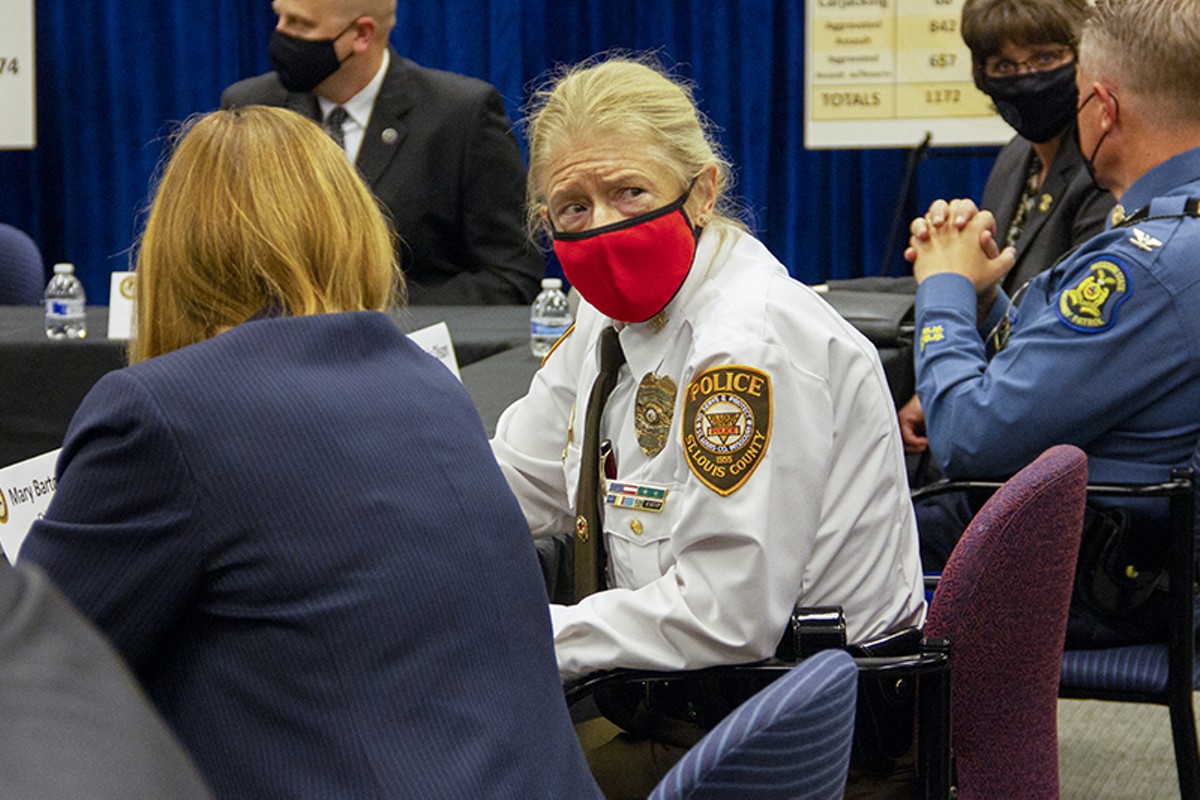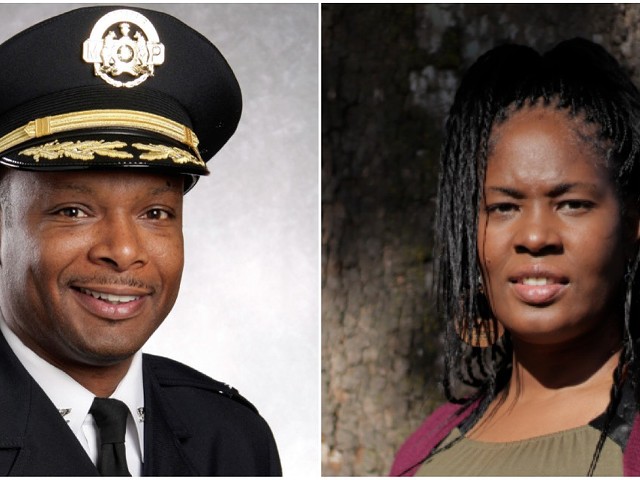St. Louis County needs to find itself a new police chief right away.
Mary Barton wasn’t right for the job when she was hired as chief last May. She isn’t right for the job right now. And most importantly, there’s no reason to believe she'll ever be right for it.
The problem is as simple as it is incurable for Barton. Running a major police department in 2021 is an enormously daunting task that requires strong leadership internally and an ability to connect with the community and inspire trust externally.
Barton strikes out on both fronts.
Her presumed strength is a resume as a 40-year veteran on the force. Turns out, that’s actually a glaring weakness: The department is wracked with racial tensions and morale problems across racial lines that are heavily attributed to the old-guard system that Barton embodies, with the exception of her gender. And the only thing she has done for women as chief is to be one.
As to the public side of the coin, Barton is especially out of her depth. She palpably despises cameras and microphones and the people on the other side of them. She doesn’t do empathy. As to race relations, she is clueless, at best.
In other words, Barton is a woman of keen intellect and plentiful police experience whose skill sets — whatever they might be — don’t even begin to intersect with those needed to be an effective police chief in St. Louis County in the year 2021. She is utterly miscast in her role.
That has never been more obvious than in the past week. Faced with two grave “no confidence” votes — one from Black police officers, the other from the St. Louis County Council — Barton went public to defend herself and displayed why everyone has no confidence in her.
She put on a clinic as to how not to do race relations. The Ethical Society of Police, representing those Black officers, eviscerated her for a “long-standing pattern of delayed responses to our requests and her ineffective actions on the tough issue of systemic racism.”
Asked by the St. Louis Post-Dispatch to cite some of her accomplishments with regard to race relations, Barton cited the fact that she meets regularly with the Ethical Society of Police. You can’t make this stuff up.
Who can forget last June 9, when Barton proved beyond all doubt that you never get a second chance to make a first impression? Barton was appearing publicly before the county council for the first time and was asked about that same topic of systemic racism in the county police department.
Barton said there wasn’t any. Next question? That didn’t work out so well.
Mind you, this meeting occurred fifteen days — count ’em, fifteen — after the May 25 murder of George Floyd in Minneapolis. America was engulfed in protests over systemic racism. It was the most significant national eruption on behalf of Black Lives Matter since the 2014 Ferguson riots where BLM all began.
Need I mention that Ferguson is a city in St. Louis County? And that the St. Louis County Police Department is a police department in St. Louis County?
Barton was destined to be linked forever to that dreadful moment. But many in ever-forgiving St. Louis were willing to attribute it to just having a bad start. There was plenty of time to come back from it, to enact an agenda aimed at gaining trust among Black officers and in the Black community.
No and no. The best Barton could offer the Post-Dispatch was to have created “a program that asks officers of different backgrounds to share their personal experiences with each other.” Alrighty then.
Perhaps there has been a major initiative to recruit and promote Black officers at the highest levels. Perhaps Barton has declared that serious priority be given to ending racial profiling and the over-policing of Black neighborhoods in the county. Perhaps Barton has been out in those neighborhoods, meeting concerned citizens, showing empathy to their grief and to their struggles, listening to them and promising her department will do better.
Perhaps not. If Barton has done any of that, the Ethical Society of Police must have missed the memo. And the same for those of us in the media. Even Barton’s present-day efforts to walk back her denial of systemic racism shows she’s still in denial:
“I’m not going to sit here and tell you there isn’t racism in the police department. There absolutely is,” Barton told the Post-Dispatch this week. “There’s also other problems in the police department. We’ve made a concerted effort over the last year to try and address those.”
Notice how nonspecific she was? And how quickly she watered down the mention of race by adding that part about “other problems"?
Barton cannot walk back and chew gun.
The chief was similarly underwhelming with her response to last Tuesday’s no-confidence resolution from the county council. The vote split along a 4-3 partisan divide, but it had lashed out hard:
“Mary Barton has fumbled her way through the position of chief with a blatant disregard for normal behavior in a community that has been torn apart due to racial tension, economic inequity and overall mistrust of police officers and a lack of community engagement to build bridges.”
Ironically, the criticism might have been a positive opportunity for Barton. She might have seized upon the bridge-building mention and offered to meet with her antagonists on the council and in the community. Simply reaching out with a degree of humility might have taken the wind out of their sails a bit.
Didn’t happen. True to form, Barton claimed to multiple media outlets that she had been “blindsided” by the county council vote. Really? The criticisms of Barton had been a topic for months from council members — including a letter from council Chairwoman Rita Heard Days — and the referendum was on the agenda and a media topic well ahead of time.
The only way Barton could have been “blindsided” is if she didn’t keep up with the news. Doesn’t she have detectives working for her? As to any humility part, forget that: Barton lashed back at the criticism as “unprofessional.”
Bottom line: Barton exhibited under heat that she cannot take the heat. And a police chief who can’t take the heat can’t be a police chief.
It’s not clear whether the St. Louis County Board of Police Commissioners has the guts to admit its mistake in passing over a dramatically more qualified chief candidate in Lt. Col. Troy Doyle — a Black man with the very skill sets Barton lacks — in favor of settling for Barton last spring. Nor does County Executive Sam Page, who owns Barton’s appointment despite his claim he didn’t like it. Or maybe he did? No one knows.
But for now, at least, this is not about politics, or about looking back. It’s about facing the terrible prospect of having a racially torn police department and racially torn community endangered by having a county police chief who just doesn’t get it.
Mary Barton is in the wrong place at the wrong time. One way or another, she needs to be moving on.
Ray Hartmann founded the Riverfront Times in 1977. Contact him at [email protected] or catch him on Donnybrook at 7 p.m. on Thursdays on the Nine Network and St. Louis In the Know With Ray Hartmann from 9 to 11 p.m. Monday thru Friday on KTRS (550 AM).






